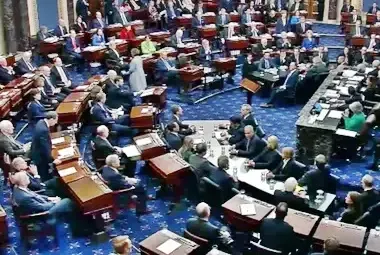US Senate Approves Defense Policy Bill, Awaiting Biden's Signature

Washington, Dec 19 (NationPress) The US Senate has successfully passed the 895-billion-USD defense policy bill for fiscal year 2025. Having already received approval from the House, it is now set to be signed into law by President Joe Biden.
The 2025 National Defense Authorization Act (NDAA) was approved with an 85-14 vote, surpassing the 60-vote requirement in the 100-member upper chamber. The military expenditure authorized by this bill marks a 1 percent increase from last year's total of $886 billion.
Independent Senator Bernie Sanders from Vermont opposed the bill, criticizing the excessive military spending that, in his view, overlooked urgent domestic needs. As reported by Xinhua news agency, he stated, "We do not need to spend almost a trillion dollars on the military, while half a million Americans are homeless, children go hungry and elderly people are unable to afford to heat their homes in the winter."
Sanders further expressed that the US should not maintain a defense system that primarily profits large defense contractors while neglecting the country's actual needs.
This NDAA also includes a significant pay raise for service members, featuring a 14.5 percent increase for the lowest-ranking troops and a 4.5 percent increase for other military personnel.
One contentious aspect of the NDAA involved health insurance provisions for military personnel and their children receiving gender-affirming medical treatment. The bill, a negotiation between Republican and Democratic lawmakers, would prevent TRICARE, the Pentagon's healthcare program, from covering transgender children of service members.
Republicans aimed to also restrict TRICARE coverage for adults who receive gender-affirming care and to reverse the Pentagon's policy of funding travel for service members crossing state lines for abortion procedures. However, these initiatives were unsuccessful due to Democratic resistance.
Regarding the US military's international engagements, the bill allocates more than requested by the Biden administration for enhancing military capabilities in the Indo-Pacific region, amounting to $15.6 billion.
It also approved the expansion of US-Israel joint military exercises amid ongoing conflicts in the Middle East, while preventing the Pentagon from disclosing casualty figures from Hamas.
While the NDAA does not directly authorize funding for the Department of Defense, it lays the groundwork for the Pentagon's programs for the upcoming fiscal year, including weapon purchases and maintaining the US military's competitive edge.
The funding for the Pentagon for fiscal year 2025 will require a separate spending bill from Congress, which must be passed by no later than September 30, 2025.









